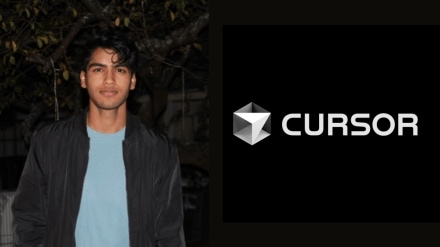Cursor is one of the most celebrated artificial intelligence coding startups in Silicon Valley today, with $2.3 billion in fresh funding, a $29.3 billion valuation and annual recurring revenue of $1 billion. Yet for its 25-year-old cofounder Aman Sanger, the dominant emotion is not triumph, but unease.
Sanger is the chief operating officer and co-founder of Anyshphere, the company behind Cursor. The tool launched in 2023 with three fellow MIT graduates. Forbes estimates Sanger and others hold a 4.5% stake in the company, valued at approximately $1.3 billion.
As per news reports, Anysphere has raised a total of $3.38 billion across six funding rounds in just three years, backed by investors including Accel, Coatue, Andreessen Horowitz, Thrive Capital, DST Global, Nvidia and Google. The company crossed $100 million in annual recurring revenue in just 14 months and exceeded $1 billion in annualised revenue by November 2025. It now serves more than half of Fortune 500 companies and counts clients such as Nvidia, Google, Adobe, Uber, Shopify and PayPal. Anysphere operates out of San Francisco and New York and employs over 300 people.
Sanger, a graduate of the Massachusetts Institute of Technology, previously worked as an undergraduate researcher at MIT’s Computer Science and Artificial Intelligence Laboratory, focusing on medical AI and natural language processing, before moving into full-time entrepreneurship through Anysphere.
Paranoia is constant
“We’re still paranoid,” he admitted in an interview with ET, describing a mindset shaped by the speed and unpredictability of the AI cycle. “Paranoia about external factors and internal factors is quite important and part of daily life at Cursor,” he added.
According to him, the paranoia runs through every layer of the company, from product decisions to hiring, from competition to organisational fragility.
Sanger does not regard Cursor as a comfortable incumbent, even with its scale. “We may be in a position of slight incumbency… and that’s dangerous,” he said. In his view, the sector does not reward stability but constant reinvention. “This is a space where you just fundamentally need to reinvent the product every few months, every year.”
He further explains that the fear is not only that competitors might be in a position to overtake them, but that the nature of programming is shifting at a pace that the organisations that need to adapt it are falling behind. “Coding becomes a lot more like reviewing the work of a number of interns,” Sanger said, describing a future where engineers move from creators to supervisors.
The burden at 25
Despite his youth, Sanger is not oblivious to the contradiction of commanding a multi-billion-dollar company while remaining deeply uncertain about its trajectory. He admits, in the interview, that the execution risk is what keeps him awake at night.
“On the product side, there is a lot to do and a lot of uncertainty about what to build and how to build it… We have to thread the needle quite perfectly to get there,” he explained. Alongside this is the challenge of maintaining talent quality while scaling. “We need to continue hiring perhaps at a faster pace, but we need to do so without lowering the bar… it feels like every single company has fallen into that trap.”
He distinguishes Cursor from firms such as OpenAI, noting that spending relative to revenue in such labs is “a significant multiple of revenue.” Instead, Cursor aims to reduce dependence on spiralling compute costs by improving efficiency and developing its own models. “The cost of intelligence has decreased significantly over time,” he noted.
“It’s important to be paranoid about maybe they did something you missed,” he said of rival companies. “And then it’s important to be paranoid about the details of what is going on internally.” Even acquisition interest does not tempt him. “We want to be a sustainable, independent company,” he insists, underlining a long-term vision that resists short-term exits.
